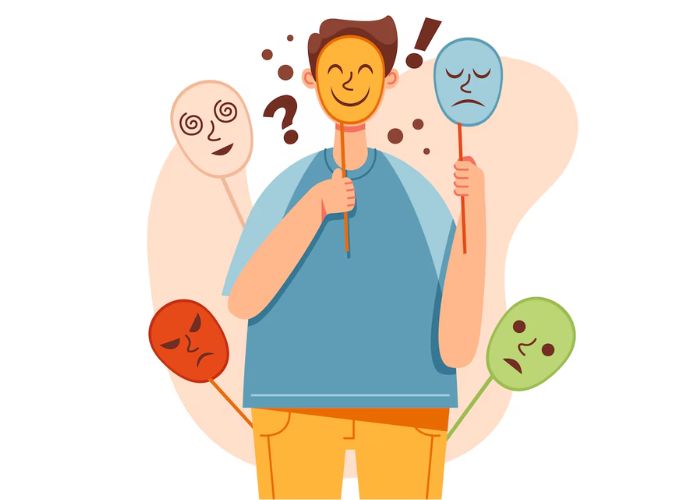Mental health touches every aspect of our lives, shaping our emotions, thoughts, and actions each day. Yet, many still ask, what is mental health? While a simple mental health definition might explain the basics, truly understanding mental health involves exploring how it influences our happiness, relationships, and overall well-being.
It’s a crucial part of who we are, impacting everything from daily tasks to major life decisions. In this guide, we’ll explore mental health deeply and practically, helping you recognize its importance, identify common challenges, and learn ways to nurture your mind and emotions for a happier, healthier life.
What is Mental Health?
Mental health is the state of emotional, psychological, and social well-being that influences how we think, feel, and behave. It affects how we handle stress, relate to others, and make choices in daily life.
Good mental health isn’t just the absence of mental illness; it involves feeling balanced, managing life’s challenges effectively, and maintaining healthy relationships. It enables us to cope with everyday stresses, work productively, and realize our potential.
Just like physical health, mental health can fluctuate, making it crucial to consistently nurture and protect it through self-awareness, support, and timely care.

Mental Health vs Mental Illness
Mental health means our overall emotional, psychological, and social well-being, involving how we think, feel, and behave daily. On the other hand, mental illness describes specific health conditions affecting thoughts, emotions, or behavior, such as depression or anxiety, and usually requires professional intervention and treatment to manage effectively.
Mental Health Definition According to WHO
Here is the definition of mental health by WHO:
“A state of well-being in which every individual realizes his or her own potential, can cope with the normal stresses of life, can work productively and fruitfully, and is able to contribute to his or her community.”
Why Mental Health Matters?
Below are the reasons why mental health is important:
- Affects Physical Health: Poor mental health can lead to physical issues like heart disease and weakened immunity.
- Improves Productivity: Good mental health boosts concentration, efficiency, and performance.
- Enhances Relationships: Healthy emotional well-being fosters stronger personal and professional relationships.
- Better Coping Skills: Enables effective management of daily stress, challenges, and setbacks.
- Quality of Life: Positively influences overall happiness, satisfaction, and enjoyment of life.
- Decision-Making: Supports clear thinking and rational decision-making abilities.
- Reduces Risk of Mental Illness: Proactive mental health care reduces risks of anxiety, depression, and related disorders.
Types of Mental Health Disorders and Issues
The following are the primary mental health issues and disorders:
1. Anxiety Disorders
Anxiety disorders involve excessive fear, worry, or nervousness that interferes significantly with daily life.

Types of Anxiety Disorders:
| Generalized Anxiety Disorder (GAD) | Specific Phobias (fear of specific objects or situations) |
| Panic Disorder | Separation Anxiety Disorder |
| Social Anxiety Disorder (Social Phobia) | Agoraphobia (fear of places/situations that might cause panic) |
Symptoms of Anxiety Disorders:
| Persistent feelings of worry or fear | Muscle tension and headaches |
| Restlessness or irritability | Sleep disturbances (insomnia or excessive sleeping) |
| Difficulty concentrating | Sweating and trembling |
| Rapid heartbeat or palpitations | Avoidance of feared situations or objects |
| Shortness of breath |
Treatment Options for Anxiety Disorders:
| Psychotherapy (Counseling) | Cognitive Behavioral Therapy (CBT)Exposure Therapy (for phobias and panic disorders)Mindfulness-Based Therapy |
| Medication | Antidepressants (SSRIs, SNRIs)Anxiolytics (anti-anxiety medications like benzodiazepines, short-term)Beta-blockers (for physical symptoms) |
| Lifestyle Modifications and Self-care | Regular exercise and yogaHealthy sleep hygieneMindfulness and meditation practicesReducing caffeine and alcohol consumption |
| Complementary Approaches | Herbal supplements (under professional supervision)Relaxation techniques (deep breathing exercises, guided imagery) |
2. Mood Disorders
Mood disorders involve significant disturbances in mood and emotional state.

A. Depression
Symptoms of depression:
| Persistent sadness or hopelessness | Sleep and appetite changes |
| Loss of interest in activities | Feelings of worthlessness or guilt |
| Fatigue and lack of energy | Thoughts of suicide or self-harm |
| Difficulty concentrating |
Causes of depression:
- Genetics and biological factors
- Brain chemistry imbalance
- Trauma and stress
- Life-changing events or chronic illness
Treatments for depression:
- Psychotherapy (CBT, interpersonal therapy)
- Antidepressant medications (SSRIs, SNRIs)
- Lifestyle changes (exercise, sleep routines)
- Holistic approaches (yoga, meditation)
B. Bipolar Disorder
Symptoms of bipolar disorder:
- Extreme mood swings (mania and depression episodes)
- Elevated mood (mania): excessive energy, impulsivity, reduced sleep need
- Depressive episodes (as described above)
- Irritability or agitation
- Difficulty maintaining daily routines
Causes of bipolar disorder:
- Genetic predisposition
- Brain chemical imbalances
- Environmental factors (stressful events, substance abuse)
Treatments options:
- Mood stabilizers (e.g., lithium)
- Antipsychotic medications
- Psychotherapy (CBT, family-focused therapy)
- Lifestyle management and support groups
3. Eating Disorders
Eating disorders involve severe disturbances in eating behaviors, weight regulation, and related thoughts.

Types of Eating Disorders:
- Anorexia Nervosa: Extreme restriction of food intake and fear of gaining weight.
- Bulimia Nervosa: Episodes of binge eating followed by purging (vomiting, laxatives).
- Binge Eating Disorder: Regular episodes of uncontrolled eating without purging.
Symptoms of Eating Disorders:
- Obsession with body shape and weight
- Extreme dieting or restrictive eating
- Over-exercising
- Frequent weight fluctuations
- Social withdrawal, anxiety around food
- Physical issues (weakness, fainting, digestive problems)
Causes of Eating Disorders:
- Genetic predisposition
- Societal pressures (body image)
- Psychological factors (low self-esteem, anxiety)
- Traumatic experiences
Treatments for Eating Disorders:
- Psychotherapy (CBT, group/family therapy)
- Nutritional counseling and education
- Medical management for complications
- Medications (antidepressants or anti-anxiety)
4. Psychotic Disorders
Psychotic disorders involve distorted awareness, thinking, and perception.

Symptoms of Psychotic Disorders:
- Delusions (false beliefs)
- Hallucinations (hearing or seeing unreal things)
- Disorganized speech or thinking
- Social withdrawal and emotional flatness
- Difficulty concentrating and memory issues
Causes of Psychotic Disorders:
- Genetic predisposition
- Chemical imbalance (dopamine)
- Brain structural abnormalities
- Environmental factors (extreme stress, drug use)
Treatments for Psychotic Disorders:
- Antipsychotic medications
- Psychotherapy (individual, family-based)
- Social skills training
- Vocational rehabilitation programs
5. Trauma and Stress-Related Disorders

A. Post-Traumatic Stress Disorder (PTSD)
Symptoms of PTSD:
- Intrusive memories or nightmares
- Avoidance of triggers
- Hypervigilance (constant alertness)
- Emotional numbness or detachment
- Irritability or aggressive behavior
Causes of PTSD:
- Exposure to traumatic events (war, violence, accidents, abuse)
- Genetic predisposition and personal history
Treatments for PTSD:
- Trauma-focused psychotherapy (CBT, exposure therapy)
- EMDR (Eye Movement Desensitization and Reprocessing)
- Medication (antidepressants, anti-anxiety)
B. Acute Stress Disorder
Similar to PTSD, but symptoms occur immediately after trauma and last less than a month.
Management:
- Immediate psychological intervention
- Short-term medication (if necessary)
- Supportive counseling and stress reduction techniques
6. Obsessive-Compulsive Disorder (OCD)
OCD involves recurring unwanted thoughts (obsessions) and repetitive behaviors (compulsions).
Symptoms of OCD:
- Persistent intrusive thoughts or fears (e.g., contamination, safety)
- Compulsive behaviors (e.g., repetitive handwashing, checking, counting)
- Anxiety or distress if compulsions aren’t performed
- Excessive time spent on obsessions and compulsions, disrupting daily life
Causes of OCD:
- Genetic predisposition
- Brain structure and chemical imbalances
- Environmental stressors or traumatic events
Treatments for OCD:
- Psychotherapy (Exposure and Response Prevention, CBT)
- Medication (antidepressants like SSRIs)
- Support groups and education
- Self-management techniques (mindfulness, relaxation)
Causes of Mental Health Issues
- Genetic Factors: Family history and hereditary predisposition.
- Biological Factors: Brain chemistry imbalances or hormonal changes.
- Traumatic Life Experiences: Abuse, violence, loss of loved ones, accidents.
- Environmental Stressors: Difficult relationships, financial problems, unemployment.
- Physical Health Issues: Chronic illness, injury, or prolonged pain.
- Substance Abuse: Drug and alcohol misuse leading to or exacerbating mental health problems.
- Social Isolation and Loneliness: Lack of supportive relationships or feeling disconnected.
- Lifestyle Factors: Poor diet, lack of physical activity, disrupted sleep patterns.
Check all the factors affecting mental health.
Risks of Mental Health Issues
- Reduced Quality of Life: Difficulty enjoying daily activities and relationships.
- Physical Health Problems: Increased risk of heart disease, obesity, diabetes, and weakened immunity.
- Social Isolation: Withdrawal from friends, family, and social activities.
- Substance Abuse: Higher likelihood of alcohol or drug misuse.
- Decreased Productivity: Poor performance at work or school.
- Self-Harm and Suicidal Thoughts: Increased risk of self-injury and suicide.
- Financial Difficulties: Challenges managing finances or maintaining employment.
- Relationship Strain: Conflicts and breakdowns in personal and professional relationships.
Mental Health Treatments and Therapies
1. Psychotherapy (Talk Therapy)
- Cognitive Behavioral Therapy (CBT)
- Interpersonal Therapy (IPT)
- Dialectical Behavior Therapy (DBT)
- Psychodynamic Therapy
- Exposure Therapy (particularly for anxiety disorders)
2. Medication (Pharmacotherapy)
- Antidepressants (SSRIs, SNRIs)
- Anti-anxiety medications (Benzodiazepines, short-term use)
- Mood Stabilizers (Lithium, anticonvulsants)
- Antipsychotics (for psychotic disorders like schizophrenia)
3. Alternative and Complementary Treatments
- Yoga and Mindfulness
- Meditation and Breathing Exercises
- Art and Music Therapy
- Ayurvedic and Herbal Supplements (under professional guidance)
4. Lifestyle and Self-care Approaches
- Regular Physical Exercise
- Healthy Diet and Nutrition
- Improved Sleep Hygiene
- Stress Management Techniques
5. Supportive and Group Therapy
- Support Groups (e.g., depression, anxiety, addiction recovery)
- Family or Couples Therapy
6. Technology-Assisted Therapy
- Online Therapy (Teletherapy)
- Mental Health Apps and Digital Tools
Mental Health for Different Groups
Mental Health in Children and Adolescents
Children and teens commonly experience anxiety, depression, attention-deficit hyperactivity disorder (ADHD), and behavioral disorders. Their mental health requires special attention, with support from parents, teachers, and mental health professionals. Early intervention and creating an emotionally supportive environment are key to their well-being.
Women’s Mental Health
Women often face unique mental health challenges, including higher rates of depression and anxiety. Life events such as pregnancy, postpartum depression, hormonal fluctuations, and menopause significantly impact their emotional health. Recognizing these factors and seeking timely support is crucial.
Men’s Mental Health
Men commonly struggle with stress, depression, and substance abuse but are less likely to seek help due to stigma and societal pressures. Encouraging open communication and normalizing the discussion around men’s mental health can lead to better outcomes.
Mental Health in Seniors and Elderly
Older adults generally face mental health issues such as depression, dementia, and loneliness, partly due to isolation or chronic illness. Specialized care, social connections, and cognitive engagement can significantly improve their emotional and psychological health.
Mental Health in Students and Young Adults
Students frequently face academic stress, career uncertainty, and social pressures, leading to anxiety and depression. Promoting mental wellness through supportive counseling, stress-management techniques, and accessible mental health resources helps them manage these challenges.
Mental Health in the LGBTQ+ Community
LGBTQ+ individuals experience higher levels of mental health issues, including anxiety, depression, and an increased risk of suicide, often due to social stigma, discrimination, and lack of acceptance. Building inclusive, supportive environments and providing specialized mental health resources is essential.
Overcoming Stigma Around Mental Health
Overcoming stigma around mental health involves openly discussing emotional well-being and recognizing mental health as a crucial part of overall health. Many avoid seeking help due to fear of judgment, isolation, or misunderstanding. Education and awareness campaigns help dismantle myths, encouraging acceptance and empathy.
Sharing personal experiences can also normalize mental health conversations, empowering others to seek support. By promoting compassionate dialogue, challenging misconceptions, and supporting accessible mental health resources, communities can foster environments where individuals feel safe to speak openly, reducing stigma and paving the way for healing, resilience, and improved mental wellness.
Mental Health Awareness Month
Mental Health Awareness Month, observed every May, aims to raise public awareness about mental health, reduce stigma, and encourage people to prioritize their emotional well-being. Throughout the month, various organizations host educational events, campaigns, and workshops highlighting mental health challenges, treatment options, and self-care strategies.
The goal is to normalize conversations around mental health, making it easier for individuals to seek support without fear of judgment. Participating in Mental Health Awareness Month helps build more understanding communities, promote early intervention, and ensure mental health receives the attention and care it deserves as an essential part of overall health.
Role of Yoga and Meditation in Improving Mental Health
Yoga and meditation significantly improve mental health by calming the mind, reducing stress, and promoting emotional balance. Yoga combines gentle physical postures, breath control, and relaxation techniques to reduce anxiety, enhance mood, and relieve symptoms of depression.
Meditation helps increase self-awareness and emotional clarity, allowing individuals to better manage negative thoughts and feelings. Regular practice of both can strengthen the mind-body connection, lower stress hormones, improve sleep, and boost overall emotional resilience.
Incorporating yoga and meditation into daily routines supports sustained mental wellness, promoting inner peace, emotional stability, and improved coping skills in handling life’s challenges.
FAQs About Mental Health
Mental health issues are very common; according to WHO, nearly 1 in 8 people globally experience a mental health disorder.
Early signs include mood swings, withdrawal, persistent sadness, anxiety, changes in sleep and appetite, irritability, and loss of interest in activities.
Mental illness can result from genetic factors, brain chemistry, trauma, stressful life events, substance abuse, and environmental influences.
Yes, genetic factors can increase the risk of developing certain mental illnesses, but environmental factors also play a crucial role.
Depression symptoms include persistent sadness, loss of interest, fatigue, and hopelessness. Anxiety involves excessive worry, fear, restlessness, and irritability.
Seek help when symptoms significantly affect your daily life, relationships, work, or when experiencing persistent distress, anxiety, or thoughts of self-harm.
Not always. Medication may help manage symptoms for certain conditions but psychotherapy and lifestyle changes also play critical roles.
Many conditions are manageable with proper treatment. Some can fully resolve, while others may require ongoing management.
Yes, poor mental health can lead to physical problems like heart disease, obesity, diabetes, and weakened immune response.
Psychotherapy, or talk therapy, involves working with a therapist to identify issues, develop coping strategies, change harmful behaviors, and improve emotional health.
CBT is a type of psychotherapy that helps individuals recognize negative thought patterns and behaviors, teaching practical skills to manage emotions and problems effectively.
Yes, regular exercise, good nutrition, proper sleep, socializing, mindfulness, and stress management significantly enhance mental well-being.
Social media can negatively impact mental health by causing anxiety, depression, low self-esteem, and feelings of isolation due to comparison and overuse.
Yes, children and adolescents can experience anxiety, depression, ADHD, behavioral disorders, and trauma-related issues.
Offer empathy and active listening, encourage professional help, avoid judgment, and help connect them to mental health resources.
Immediately seek support from a trusted person, contact mental health professionals, or reach out to suicide prevention helplines.
Stigma involves negative stereotypes and judgments about mental illness. We can overcome it through education, open conversations, awareness campaigns, and advocacy.
Awareness reduces stigma, encourages early intervention, promotes understanding, and ensures better support and treatment outcomes.


